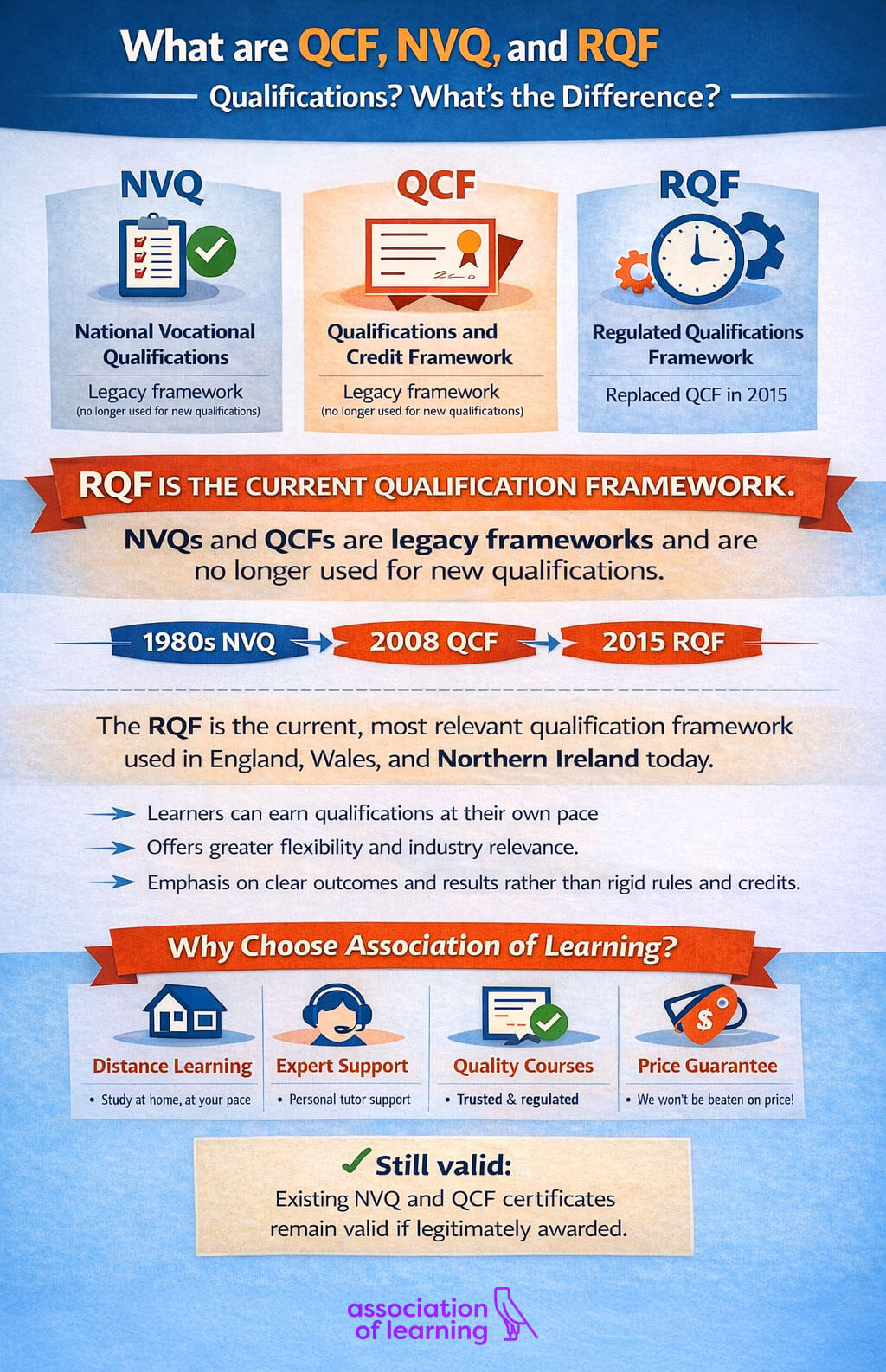Last Updated: 23rd January 2026
The RQF replaced the QCF in 2015, which replaced the NVQ in 2011. Confused? You’re not alone. Today we’ll break down these frameworks, iron out the confusing bits, and answer the following questions:
- What is an NVQ?
- What is a QCF?
- What is an RQF?
- How do RQF courses work?
- When did the system change?
- What are the differences between NVQ, QCF, and RQF qualifications?
- Are RQF courses better?
- Is my NVQ still valid?
- Is my QCF still valid?
- Why choose Association of Learning for an RQF course?
The Old Frameworks (QCF & NVQ)
NVQ
National Vocational Qualifications were earned on the job and serve as proof of competence in a given field. There are a total of eight levels, starting at level 1 (which focuses on fundamental workplace skills) and ending at level 8 (when students were expected to be working at the management level). To earn an NVQ you had to be evaluated based on portfolios and observational sessions with an assessor.
QCF
The Qualifications and Credit Framework, or QCF, was a way for England, Wales, and Northern Ireland to classify and recognise qualifications based on how hard they were and how many credits they were worth. It was meant to make it easy to understand and compare qualifications from different subjects and institutions in a clear and consistent way. It was introduced in 2008 to replace the NVQ framework. A QCF course was more adaptable and less time-consuming than an NVQ course. By taking a QCF course, you could obtain one of 3 types of qualifications:
- Certificate (13-36 credits)
- Diploma (37+ credits)
- Award (1-12 credits)
The New System (RQF)
The Regulated Qualifications Framework (RQF) is a system used in England, Wales, and Northern Ireland to classify and regulate qualifications based on how hard they are and how much learning they require. It replaced the old system (QCF) in October 2015 to help people understand and compare qualifications in a clearer and more flexible way. Under the RQF, there is no time limit to finish your qualifications like there was under the old systems. Students can instead work through them at their own leisure. Since the framework lacks the QCF’s strict rules on institutions, awarding bodies are allowed to constantly assess, refine, and advance their courses. Now, awarding bodies can put more emphasis on results.
How do RQF Courses Work?
- Levels – Like the QCF before it, the RQF uses a system of levels to show how hard qualifications are. There are also eight levels, from Entry to Level 8, where Entry Level is for learners with basic skills, and Level 8 represents the most advanced qualifications (often at doctorate level!).
- Qualification Descriptors – Each level of the RQF is associated with qualification descriptors. These outline the knowledge, skills, and competencies expected of learners at that level. These descriptors offer a clearer understanding of what qualifications at each level entail.
- Total Qualification Time (TQT) – One of the major changes introduced by the RQF is Total Qualification Time (TQT). TQT is the estimated amount of time that a learner would need to complete a qualification, including guided learning, independent study, and assessment. This helps learners get a better idea of the time commitment they need to make to achieve a qualification.
- Guided Learning Hours (GLH) – Under the umbrella of TQT, are Guided Learning Hours (GLH). They represent the time spent in teacher or tutor-led instruction. This gives students a clear picture of how much of their chosen qualification is structured learning.
- Flexibility and Recognition – Thankfully, like the QCF, the RQF also emphasises the recognition of prior learning. Students are able to accumulate credit across qualifications and learning institutions, making it much easier to transfer credits and build up qualifications over time!
- Qualification Types – The RQF still upholds the qualification types in the QCF: Awards, Certificates, and Diplomas.
- Industry Relevance – RQF courses are also still designed to align with the needs of employers, as they’re developed to match industry standards. Learners on RQF courses acquire relevant skills to the job market.
- Awarding Organisations – Organisations that offer RQF courses need to design and deliver courses that adhere to the framework’s principles. The result is a huge variety of qualifications on offer, catering to the needs of every student and industry.
When Did The Changes Occur?
NVQ’s were introduced in the 1980s to offer a qualification framework focused on training and development. By 2008, the system had become dated, and the QCF began allowing greater progression and career mobility to learners. Eventually, NVQs were added to the QCF framework. In 2011, the shift became official, and all NVQs were placed in the QCF, enabling all qualifications attained across the UK to hold the same credits and achievement levels.
QCF → RQF
As the QCF became the main framework used for courses in the UK, it was reviewed. The findings showed that the QCF framework focused too heavily on structure over validity. As an answer to this, RQF qualifications were introduced. By October 2015, the decision was made to transition from the QCF to RQF. This move allowed students the opportunity to study from home at their own pace, due to the RQF getting rid of hard and fast deadlines associated with certification sizes. 2018 saw the complete shift of QCF qualifications to the RQF Framework.
What’s the Difference?
You may be scratching your head and wondering what the difference really is between these frameworks.
While they have a lot in common, there are a few key differences:
Total Qualification Time (TQT) vs. Credits and Units
- RQF: The new RQF system introduced the concept of TQT, or Total Qualification Time, which offers a far more accurate way for learners to gauge the time a qualification will take.
- QCF: The old QCF system was based on units and credits, where each unit completed held a credit value, indicating the time it took to complete.
Qualification Descriptors
- RQF: The RQF has introduced qualification descriptors for each qualification level, outlining what’s expected of students. This has helped learners have a clearer understanding of content and the expectations of the course.
- QCF: The QCF also used to have level descriptors, but the RQF has surpassed it in terms of detail.
Flexibility and Credit Accumulation
- RQF: One of the most important features of the RQF is its commitment to flexibility and credit accumulation. Learners can earn credit and transfer it across different qualifications and schools/colleges allowing for more personalised learning experiences.
- QCF: The old framework also allowed credit accumulation, but there were much more rigid rules compared to the RQF.
Are RQF Courses Better Than QCF and NVQ?
Absolutely. The RQF’s descriptive make-up allows awarding bodies the freedom to develop, update, and replace qualifications as needed. There’s less of a focus on strict rules and structure, and more focus on outcomes, the goals of the qualification, and promoting creativity.
How RQF Aligns with Professional Registration (e.g., Early Years, Adult Care)
RQF qualifications are recognised by regulators and professional bodies across childcare, health, and social care. Courses like the Early Years Educator and Adult Care Diploma meet full and relevant criteria, helping learners gain recognised status in their field.
Is My NVQ Still Valid?
Definitely! Any NVQ certificate issued by an awarding institution is valid as long as it was legitimately acquired, regardless of which certifications you choose to undertake in the future.
Is My QCF Still Valid?
Yes! The most important thing to remember is that a certificate issued by an awarding institution is valid if it was legitimately acquired, no matter what courses you decide to enrol on later.
Why Choose Association of Learning for an RQF Course?
Association of Learning have over 400 home learning courses for you to choose from. Whether you are looking to extend your current knowledge with a new qualification, or wish to embark on a career change, our range of distance learning courses will suit your requirements.
Distance Learning
Our approach to distance learning is designed to work around busy people like you. Now you can gain the qualifications you want in the comfort of your own home, without the pressure of tight deadlines. There’s no better time to rediscover yourself and be at your best.
Why Learn with Us?
✔ Personal tutor support
✔ Trusted and regulated
✔ Flexible, simple learning
Quality
Association of Learning offer quality courses which are compliant with current regulations and updated regularly.
Experience
Our team have a combined knowledge of 25 years in the learning sector, leading the way with progression.
Technology
Our systems are built around the latest e-learning technology to provide you with the best learning experience.
Price Guarantee
If we can’t beat our competition, we’ll provide your learning free of charge on like for like courses.
To learn more about our RQF courses, click here.
To explore our entire range of qualifications, follow this link to our course catalogue.







Comments (0)
Join the conversationCancel Reply